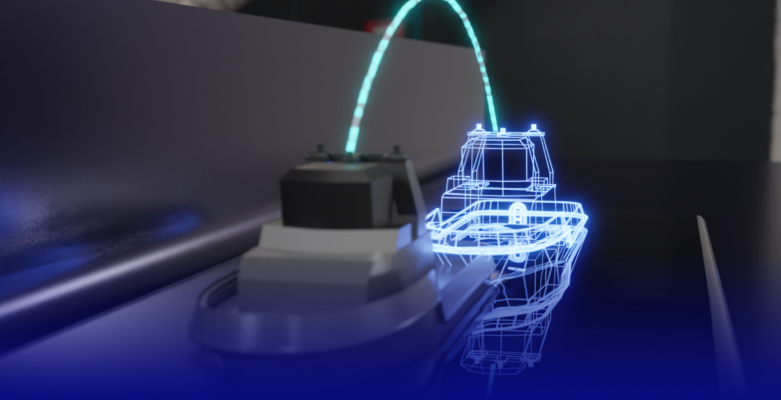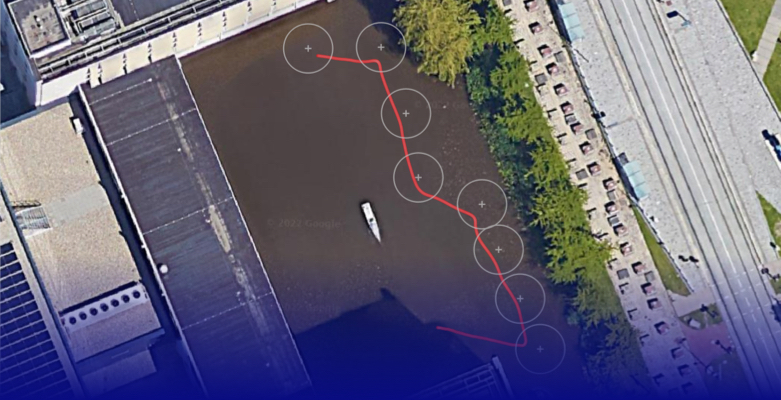Real-time guidance for autonomous vessels to reduce emissions
How can we use technology to ensure that ships emit less CO2 and particulate matter in the port of Rotterdam? Deltares studied this question for Resilient Delta and DigiShape in the DigiPACT project.
Real-time guidance for autonomous vessels to reduce emissions
How can we use technology to ensure that ships emit less CO2 and particulate matter in the port of Rotterdam? Deltares studied this question for Resilient Delta and DigiShape in the DigiPACT project.
The port of Rotterdam is Europe’s largest seaport and it will continue to expand in the near future. Approximately 100,000 inland vessels and 29,000 ocean-going vessels sail to and from the port annually. They generate considerable emissions of particulate matter and CO2: between 15% of particulate matter and 4% of Dutch CO2 comes from shipping. Even so, the EU wants to use shipping more because emissions per unit of cargo are much better than other forms of transport. At the same time, low water levels are increasingly common in the summer, and so vessels have to use more fuel to complete their journeys. “All those ambitions do sometimes create friction,” says Fedor Baart. “With DigiPACT, we can advise vessels about their speed and route in real time, taking all these factors into consideration.”

Fedor Baart
Fedor Baart, data science specialist at Deltares and TU Delft. Fedor works at the Rivers department of Deltares and at the Ports and Waterways group of TU Delft. Together with Master student Max van Gijn, he has been setting up the experiments and linked the various models together within the Digishape project. He was also responsible for bringing the application into practice.

“DigiPACT shows that we can actually have an impact on shipping emissions in urban areas”
Cem Akilli, Port and Maritime project manager of the City of Rotterdam
Green steaming and green routing for low-emission sailing
DigiPACT is a digital twin of the lab version of the port of Rotterdam, which has been built to scale in the pond at Delft University of Technology. The screen shows in real time where the ships are sailing in the pond, how fast, which berths are available and where the quay walls are. Fedor Baart: “With a model like that, you can do an awful lot. We focused on the optimal speed and route of the vessel. For example, if there are a lot of waves, or vessels are backing up outside the port, it is better to wait or slow down to save energy. We call this ‘green steaming’. The ship may also take a detour or a completely different route. We call this ‘green routing’. We can also combine these functions.”

The real ship maintains two-way communication with the virtual ship

Autonomous ship Tito Neri of the Researchlab Autonomous

Visualisation of "green steaming." The middle location (red) is occupied. Therefore, the ship chooses to slow down. The ship arrives when the location is available again.

Visualisation of the route taken in an aerial photograph (source Google Maps).

Photo of the research pond at the Autonomous Shipping Research Lab at 3ME, TU Delft (source: Max van Gijn)
A digital twin that makes calculations in real time
DigiPACT was developed in the RAS lab at Delft University of Technology, adding models of the port of Rotterdam and route selection information to existing simulation software for shipping movements. New software has also been incorporated, making it possible to provide vessels with real-time sailing recommendations. “As the ship sails, DigiPACT calculates which route and speed are the most efficient and it passes on this information a few times every second,” explains Fedor Baart. “In the shipping industry, this is very innovative because most simulation software only calculates scenarios for the future, not what is actually happening.”
Application - Deltares worked on this project with DigiShape and Resilient Delta, an alliance including Erasmus University, Erasmus MC and TU Delft. Deltares focused on the integration of a range of models and the link to practice. The experiments took place in the lab at Delft University of Technology, where knowledge about robotics, and water and logistics, was integrated. DigiShape provided the organisational and legal backup.
The results from DigiPACT are useful for the port of Rotterdam, but also for other ports around the world. A lot of work is needed before the model can be used in practice. “The insights we have now accomplished on a lab scale will eventually have to be put into practice,” says Fedor Baart. “The PATH2ZERO project is working on that step with funding from the Netherlands Organisation for Scientific Research and in line with the National Science Agenda. Deltares and Delft University of Technology also have a role in terms of contributing knowledge from DigiPACT. I hope that what we have developed now will be installed in sailing systems a few years from now.”
The final report and open source code can be requested from Fedor Baart.
“I hope that what we have developed now will be common in the throttle of ships in a few years' time”
Fedor Baart, specialist data science
Ships are the most efficient way to transport cargo around the world because they use the least amount of energy per unit of cargo. That is why the EU wants the sector to expand while taking action to reduce emissions.

